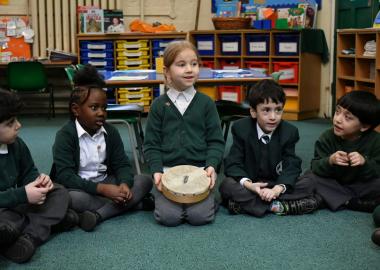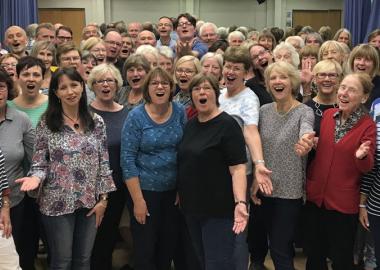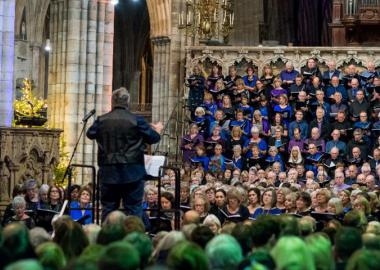Elizabeth Beroud, Chair of Beckenham Junior Choir (BJC), explains how creative thinking and tiered rewards helped them hit their fundraising targets for an ambitious new commissioning project.
Background
Beckenham Junior Choir is a non-profit organisation working to promote music for young people in the local community. Established in 1993, it gives children and young people aged 6 to 18 in the Beckenham area a unique singing opportunity covering a wide variety of music in a non-competitive atmosphere. The choir prides itself on its access to all, with no auditions and low termly fees (with bursaries available for families who can’t afford them).
James Olsen, who grew up in Beckenham, was the first assistant director of the Beckenham Junior Choir as a teenager in the 1990s. He subsequently gained a double starred first in music from King’s College Cambridge and is now one of Britain’s leading young composers. He approached the choir’s Musical Director, with whom he had remained in contact, and suggested that the choir might like to commission a new children’s opera, based on the medieval legend of St Jerome and the lion, entitled One of our Brothers is a Lion!
The choir committee discussed the proposal and accepted on the basis that it would be an amazing experience for the children to be involved in an opera and that it would be a wonderful musical project to bring to the Beckenham community. The project also came highly recommended by the Musical Director.
The challenge
Our aim was to give every member of the choir (aged 6 to 17) the opportunity to be a part of the staged opera which James Olsen had offered to write for us, and to give them a memorable musical and theatrical experience. We needed to fund, rehearse, stage and perform the opera – all in the space of less than six months!

We set a budget of £5,500 to cover mainly the commissioning costs (£4,800) and the production expenses (e.g. costumes). We also committed to two performance dates: at our Spring concert in Beckenham and at our Summer concert in Broadstairs.
From the choir’s point of view, the main challenge was setting up the fundraising programme to meet our ambitious target, equivalent to 1.5 times our annual budget.
What we did
The composer produced a brochure on the opera and worked with the choir committee to produce a tiered rewards structure for patrons, individuals and companies, based on the online crowdfunding models. We deliberately set the initial bar quite low (£50) to attract as many people as possible, with the top tier for donations of £1,000 or more. Given the tight timeframe, the composer generously de-risked the project by committing to deliver the opera once half the funds had been raised.
The committee organised a project launch meeting between the parents and the composer to get the whole choir community on board, and then conducted an email campaign to parents, Friends and former members of the choir and a telephone/door-to-door campaign to local businesses.
Many parents got involved and helped to raise funds or save money in the following ways:
- baked cakes to “sell” at our two winter/spring concerts
- knocking on doors of local businesses for contributions in money or in kind
- organised a raffle with items donated by local businesses and choir families
- photographed the children in rehearsal and then offered the photos to parents in return for a donation
- made costumes
- made masks and props
- designed posters and leaflets
We published press releases and regular updates on our website, Facebook page and Twitter account. A member of our older choir set up an Instagram account. Another did the illustrations for our publicity material (see below).

The composer was a driving force throughout and actively promoted the project to his own list of contacts, to local businesses and on his social media accounts. He created a “vlog” diary of the creation of the opera which kept everyone entertained and helped build excitement amongst the children and young people and the families. He also reached out to a number of famous individuals connected with the Beckenham area, resulting in a donation to the project by celebrated literary critic Professor Sir Christopher Ricks.
The composer and the Music Director liaised closely on all matters musical, agreeing on the score as it was being written, then casting and rehearsing week by week. Given the short timescales, it was very often a “just in time” process, but the fact that they had absolute trust in each other which was crucial. The composer helped by coming to as many rehearsals as he could manage.
The results
From an artistic and educational point of view, the impact was first of all that it represented a fantastic achievement on the part of the children and young people who rehearsed, memorised and performed an opera, involving singing, acting and movement, in a very short space of time (less than six months). All of them enjoyed the experience tremendously. As one mum put it:
'This has been such an inspiring project for my girls and for all the children involved. They have learned a lot whilst having fun as well, and also gained considerably in self-confidence.'
From a fundraising point of view, we got off to an extremely good start with some generous patrons coming forward at the very initial stage, meaning we quickly hit the 50% commission fee target for the project to be viable. We had to work harder to raise the next tranche, because the money came from lots of different sources and in smaller amounts. However, in the end we raised the full budget and indeed over £120 more than our target. By carefully managing costs, the project eventually made a small profit for the choir: not something which can be said of many new opera commissions!
Perhaps as importantly, the opera galvanised the whole choir community with parents and extended family helping in every respect, from the fundraising, to the making of masks, props and costumes, and stage design. It has really brought the committee members and the parent community together in a unique way.
What we've learned
|
Find out more about the Beckenham Junior Choir on their website or follow them on Facebook / Twitter.
We hope you find this Making Music resource useful. If you have any comments or suggestions about the guidance please contact us. Whilst every effort is made to ensure that the content of this guidance is accurate and up to date, Making Music do not warrant, nor accept any liability or responsibility for the completeness or accuracy of the content, or for any loss which may arise from reliance on the information contained in it.











